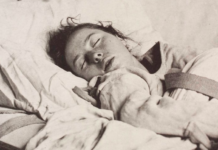Murphy’s Mental Health Bill a Threat to Civil Liberties
In an Op-ed for the Times Union, Madeleine Ringwald explains how the Helping Families in Mental Health Crisis Act “would severely disable protection and advocacy organizations from protecting the civil, legal and human rights of people in mental health services.” “Whether you examine it through a scientific, civil rights or bottom-line lens, Murphy's bill should appall you,” she writes. “Any legislation that bolsters institutionalization at the cost of community-based services seeks not to help those with mental health needs, but help society find ways to hide, suppress and silence them.”
5 Ways to Address a Mental Health Crisis Without Calling 911
From The Body Is Not An Apology: For many people, calling the police during a mental health emergency can result in brutality. Here are five...
Lancet Study Questions Safety of Locked Psychiatric Wards
A new study published in Lancet Psychiatry challenges the common practice of locking psychiatric wards to prevent patients from attempting suicide or leaving against...
Cultural Confusion: The Shifting Line Between Sane and “Unsane”
From STAT: An unprecedented number of Americans have been diagnosed with a mental, behavioral, or emotional disorder. Does this represent an increase in psychological distress...
Justina Pelletier: The Case Continues
On March 25, Joseph Johnston, Juvenile Court Justice in Boston, Massachusetts, issued a disposition order in the case: Care and protection of Justina Pelletier. The background to the case is well-known. Justina is 15 years old. Judge Johnston did not return Justina to the care of her parents, but instead granted permanent custody to the Massachusetts Department of Children and Families (DCF), with a right to review in June. The disposition order is somewhat terse and sparing in its tone, but reading between the lines, it seems clear that the court has determined that Justina either does not have mitochondrial disease or that, even if she does have mitochondrial disease, her concern about this matter is inappropriate and excessive.
How to Escape Psychiatry as a Teen: Interview with a Survivor
When I lived in Massachusetts I taught yoga and led writing groups for alternative mental health communities. While the organizations I worked for were alternative, many of the students and participants were heavily drugged with psychiatric pharmaceuticals. There was one skinny teenager I'd never have forgotten who listed the drugs he was on for me once in the yoga room after class: a long list of stimulants, neuroleptics, moods stabilizers; far too many drugs and classes of drugs to remember. I was at the housewarming party of an old friend, and who should walk in but that boy who used to come to my yoga classes and writing groups religiously. And he was no longer a boy; he was now a young man. “I'm thinking yoga teacher,” he said. I nodded. Did he remember where? “I'm not stupid,” he said, as if reading my mind. “I'm not on drugs anymore. I'm not stupid anymore.”
What About Fat Voices? Our Experience With Fat Invisibility
In this piece for Resilient Fat Goddess, psychologist and fat activist Rachel Millner critiques the pervasiveness of fatphobia, sizeism, and weight bias within the eating...
The Other Foucault
From The Nation: In two new books, Foucault: The Birth of Power and Foucault's Last Decade, Stuart Elden investigates some of the unexplored aspects of Michel Foucault's...
Current Research on Outpatient Commitment Laws (“Laura’s Law” in California)
Outpatient commitment laws, passed by a number of states, permit forced commitment to treatment of those whom a psychiatrist, psychologist, or mental health official deems in need of treatment. The majority of this “treatment,” while not specifically written in the law, results in coercive tactics to pressure agreement to take pharmaceutical preparations of limited-to-no effectiveness but - as shown in early research - with massive effects on cognitive functions and subsequent decision-making ability, not to mention a long-term or lifelong diminished quality of life and ability to function as a productive member of society.
When “Recovery” Feels Like a Trap
People in roles of power in the mental health system often don’t realize how much complicity they have in actually creating the symptoms they claim are biologically-based in individuals with psychiatric labels.
A Feminist Neuroethics of Mental Health
From The Neuroethics Blog: When populations are divided into two genders, women show roughly double the incidence of depression, anxiety, and stress-related mental health concerns....
Christmas Songs Played on a Loop Can be Bad for Mental Health
From Providr: Many retail stores have already begun rolling out Christmas decorations and playing Christmas music. A clinical psychologist recently warned that playing Christmas music...
Psychiatry: We Need a Truth and Reconciliation Commission in Mental Health
My name is Leah Harris and I'm a survivor. I am a survivor of psychiatric abuse and trauma. My parents died largely as a result of terrible psychiatric practice. Psychiatric practice that took them when they were young adults and struggling with experiences they didn’t understand. Experiences that were labeled as schizophrenia. Bipolar disorder. My parents were turned from people into permanent patients. They suffered the indignities of forced treatment. Seclusion and restraint. Forced electroshock. Involuntary outpatient commitment. And a shocking amount of disabling heavy-duty psychiatric drugs. And they died young, from a combination of the toxic effects of overmedication, and broken spirits.
Ohio Attorney General Sues Prescription Opioid Manufacturers
Ohio Attorney General Mike DeWine has filed a lawsuit against five leading prescription opioid manufacturers and their related companies in Ross County Court of Common...
“Medicating a Prophet”
In the New York Times Sunday Review, Irene Hurford, a psychiatrist, reflects on the ethics of forced treatment for psychosis. “As doctors,” she writes,...
The Unique Way the Dutch Treat Mentally Ill Prisoners
In this piece for BBC, Melissa Hogenboom reports on the way that people who have been convicted of crimes and diagnosed with mental illness are...
“Forced Psychiatry in Ohio – Instrument of Political Oppression?”
Government whistleblower and journalist Linda Leisure was diagnosed with a mood disorder and forcibly treated after an altercation with local police, according to Katherine...
Psychiatry is a Disaster Area in Healthcare That Needs Attention
In this piece for The BMJ, Dr. Peter Gøtzsche points out several of the major problems with the drug-based paradigm of psychiatric care as well as...
“Electric Shock Therapy Led to Sunderland Patient Having Permanent Fit”
Update: Elsie Tindle has sadly passed away after a forced electroshock treatment triggered an epileptic fit and permanent brain damage. The psychiatrist, Eugene van...
Madness Radio: Daniel Hazen On Abolishing Prisons
First Aired 5-1-2012
What is it like for a prisoner diagnosed with mental illness? Should we have more mental health treatment in prison -- or...
The $3 Billion Research Breakdown
In this piece for Medscape, Jodi S. Cohen chronicles the research malpractice case of child psychiatrist Mani Pavuluri, who put vulnerable children at serious risk...
The Mental Health System Can’t Stop Mass Shooters
In this piece for The New York Times, psychiatrist Amy Barnhorst explains why it is not feasible for mental health professionals to identify or treat people...
Six Ways You Can Really Help Prevent Suicide
The first time I tried to kill myself, I was 14. I won’t go into the indignity of being involuntarily locked up, time after time, until I satisfactorily convinced the staff that I wouldn’t harm myself or attempt suicide again. (I was lying.) The system taught me to lie, to hide my suicidal feelings in order to escape yet another round of dehumanizing lock-ups and “treatments.”
My Thoughts on an Alternative to HB1386 in Colorado (Open Letter)
I oppose HB1386 and request it be voted down. That, though, is not enough and I know it. So, here, I propose an alternative plan to HB1386.
An Open Letter to Colin Powell
Dear Colin Powell: You shared that your wife was diagnosed by a psychiatrist as having a ‘chemical imbalance.’ You said she was, as a result, put on psychotropics and found success after doing so. I’m not going to attempt to take that away from her, but whereas so many issues encompass shades of gray, the chemical imbalance theory does not. The chemical imbalance theory is not just unproven; It is debunked. But you need not take my word for it.





















